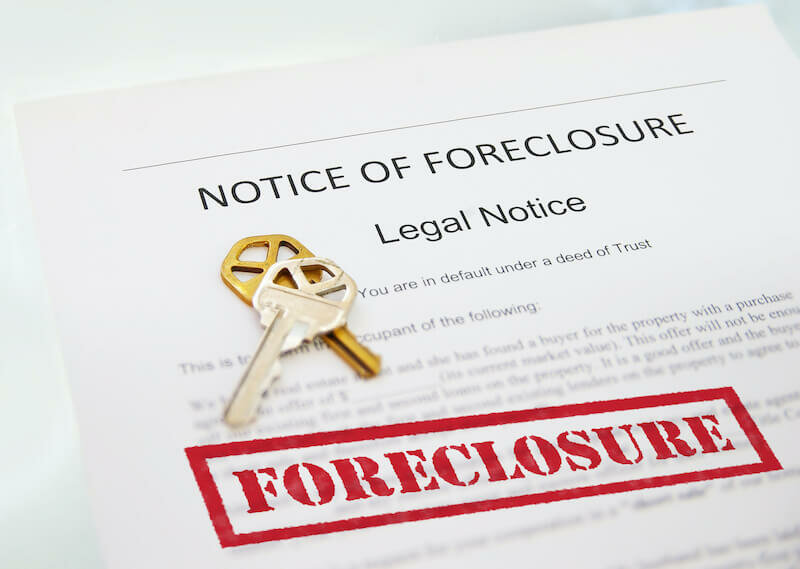Do you dread getting phone calls from collections companies or opening letters that say urgent or final notice? They’re all unpleasant reminders that finances are tight, and you’re getting behind on your mortgage payments.
Unfortunately, this happens to a lot of people and seemingly overnight. You could be doing great, and then all of a sudden lose your good-paying job or have a recent medical condition diagnosed, and now your monthly budget is consumed by expensive medical bills and prescriptions. Maybe you’re in this position because you own a rental property and had a bad tenant that just up and left, and now you have to cover two mortgages instead of only one.
Whatever the circumstances may be, the best thing to do is to avoid foreclosure at all costs, and one way to do that is to sell your home before it’s final. But is it possible to sell a house in foreclosure in Nebraska? What is foreclosure anyway, and why is it so bad? We’ll answer all your foreclosure questions, reveal foreclosure alternatives, and more in this helpful Q & A.
Can You Sell A House in Foreclosure?

What is Foreclosure?
Foreclosure legally is a process in which a lender or mortgage company tries to retrieve the amount owed on a home loan that has fallen behind by taking ownership of and selling the mortgaged property. Typically this step is triggered by a borrower missing a specific number of monthly payments but can also occur when a loan holder fails to meet other terms in their mortgage loan agreement.
The foreclosure process is different from state to state, but generally, banks try to work with loan holders to get them caught up on past-due payments and avoid foreclosure.
The foreclosure process abides by its legal grounds within the mortgage or deed of trust contract, which gives the mortgage lender the right to use a home as collateral if the borrower fails to uphold the terms of the agreement.
All that to say, if you get behind on your mortgage payments, your mortgage lender has the legal right to take your home unless you can pay back all the missed payments and maintain future payments.
Some mortgage lenders do offer payment alternatives to work with borrowers that are having a difficult time paying their mortgage and past due payments. Some of those options would include:
- Repayment Plans
A repayment plan would add past due amounts to the loan holder’s monthly mortgage payment to be repaid for however many months it takes to bring the home loan current. This scenario gives the loan holder time to catch up on late payments without having to come up with a big lump sum payment instead.
- Forbearance
This option allows the loan holder to make either smaller mortgage payments or no mortgage payments until the loan holder improves their financial situation. Usually, forbearance is granted when a borrower is in a temporary or short term financial situation. After the forbearance grace period, the loan holder is expected to pay any missed payments or amounts, which are generally paid with a repayment plan or loan modification.
- Deed in Lieu of Foreclosure
Deed in lieu of foreclosure is where the loan holder voluntarily hands over the homeownership to the mortgage lender in exchange for waiving the mortgage loan and payments. However, something to keep in mind is that the borrower may need to pay off the remaining balance of the mortgage if the value of the home is lower than the outstanding amount. This option would allow the loan holder to relocate from the property without going through the Nebraska foreclosure process but wouldn’t leave you with any equity.
- Short Sale
Selling your house in a short sale is another foreclosure alternative. The borrower sells their residence for quite a bit less than the total balance that is remaining on the mortgage note. By selling the home, the loan holder can pay off part of the mortgage balance with the profits. Keep in mind that the borrower may be asked to pay off the remaining balance of the mortgage. A bonus to selling in a short sale is that it helps the loan holder transition out of their residence without going through Nebraska foreclosure. But usually, the sale is handled by the mortgage company and requires their approval of the buyer before they are willing to let you sell the property.
Can I Buy The House Back?
Nebraska has no right of redemption. The right of redemption gives a borrower the right to repurchase the property following a foreclosure sale, but Nebraska doesn’t give borrowers the right to repurchase the home.
How Many Missed Payments Before Foreclosure?
The foreclosure process generally begins when a borrower defaults or misses at least one mortgage payment. The loan holder then sends a missed payment notification that says they haven’t received that month’s payment.
If the borrower were to miss two payments, the loan holder sends a demand letter, which is more severe than a missed payment notice. But the lender may still be open to making arrangements for the borrower to get caught up on the missed payments.
The mortgage lender will send a notice of default after 90 days of missed payments. After that, the loan is handed over to the lender’s foreclosure department.
The loan holder typically has another 90 days to settle the payments and reinstate the home loan, which is called the reinstatement period. Once the end of the reinstatement period is reached, the lender will begin to foreclose if the borrower hasn’t made up the missed payments.
Nebraska follows the federal mortgage servicing laws that state the servicer usually can’t initiate foreclosure until the borrower is more than 120 days delinquent on the loan.
So roughly four months of missed payments before foreclosure steps are taken, but every mortgage company is different. To find out specifically how many missed payments would initiate the foreclosure process, talk to your lender, or look over your loan documents.
However, it would be best not to get to that point and make arrangements before you are stuck in foreclosure.
What is the Foreclosure Process in Nebraska?
Each state has different laws that govern the foreclosure process but are usually handled in one of two ways.
- Judicial Foreclosure
This is where the lender goes through the courts to get permission to foreclosure by proving the loan holder is delinquent. If the court approves the foreclosure, the local sheriff auctions the home to the highest bidder to try to recoup the money owed, or the bank becomes the owner and tries selling the property by traditional means.
- Non-Judicial Foreclosure
This type of foreclosure does not go through the court system. Instead, the foreclosing party (the mortgage company) follows the requirements that the Nebraska statute requires. This also means that the foreclosure happens quickly and inexpensively because it doesn’t involve the court unless the homeowner sues the lender.
Though the foreclosure process in Nebraska is generally handled in a non-judicial manner, it would still be a good idea to work with a foreclosure attorney to help explain your legal obligations and actions you need to take. One such thing you may not be familiar with but a foreclosure attorney would be is deficiency judgments in Nebraska. If a foreclosure sale doesn’t bring enough money to pay off the borrowers’ total debt, the difference between the two amounts is called a deficiency. Following a non-judicial foreclosure in Nebraska, the lender may get a deficiency ruling against the loan holder by filing a lawsuit within three months after the foreclosure sale.
How Long Does The Foreclosure Process Take?
In Nebraska, foreclosures can be judicial, but they are usually non-judicial, meaning the foreclosure doesn’t go through the court system, and it quicker. Under Nebraska law, the borrower generally receives two non-judicial foreclosure notices.
- Notice of Default
- Notice of Sale
Notice of Default
A trustee starts the foreclosure procedure by submitting a notice of default to the county recorder’s office, which gives the loan holder one month to cure the default (pay the outstanding amount). Curing the default is also known as reinstating the loan.
Notice of Sale
After one month, if the loan holder doesn’t cure the default, the trustee posts a notice of sale in the local newspaper once a week for five weeks. They will also send copies at a minimum of 20 days before the sale to anyone who has filed a request for notice.
Compared to other foreclosure judgments, the Nebraska foreclosure process can be very quick and completed in just a few months.
When Is It Too Late To Stop a Foreclosure?
Once you reach the ‘Notice of Default’ stage in the Nebraska foreclosure process, that will be your last chance to halt the process before it’s too late to stop foreclosure. Usually, lenders want to work with borrowers to come up with solutions to pay back the loan, keeping you in the property. But if you fail to communicate with them and get to the ‘Notice of Sale ‘phase, then that’s when it will probably be too late to stop a foreclosure. Any way you can avoid foreclosure would be in your best interest, and usually, the best way to do that is to sell the property.
Selling a House in Foreclosure in Nebraska
Until your house reaches the ‘Notice of Sale’ phase, you should be able to sell your property. As mentioned above, any way you can avoid foreclosure would be in your best interest. A foreclosure on your property can severely affect your credit score and your ability to buy something in the future.
When dealing with this type of situation, the best option is to sell your home to avoid foreclosure and find something that is more financially manageable. If that is your goal and solution to paying your mortgage off, make sure you vocalize your intentions to your lender. Unless you communicate what you plan to do to pay them back, they will continue proceeding with the foreclosure process. Usually, when the lender is informed of your plans to sell, they may be a little bit lenient to work with you and may even give you extra time. But some lenders may not. Regardless, you will need to find a way to sell your house quickly to resolve being behind on your monthly payments. The sooner you sell your property, the better your financial situation.
There are a few ways you can sell your home; typically, people look at working with a local Nebraska real estate agent or selling by owner. Both would include getting your house ready to sell, doing some home repairs, and wouldn’t guarantee a quick home sale- not to mention they’ll include realtor commissions and closing costs.
Another option would be to sell your house as-is to help cut down on the cost of repairs and the time it would take to complete the renovations. But, it’s usually hard to find prospective buyers willing to take on that expense and work as soon as they move in.
So you could look into selling to an iBuyer; instead. They buy houses as-is, but the only problem with their offer is that it deducts all those needed repairs and then tacks on almost 6.7% in service charges, which ends up being more expensive than selling with a realtor.

Another Selling Solution
A different solution would be to sell your Nebraska home to a local home investor like Element Homebuyers. Element Homebuyers is a family-owned professional homebuying company based in Lincoln, Nebraska, and purchases houses for any reason.
What sets Element Homebuyers apart from the other selling strategies is their ability to close quickly (within 7-14 days), unlike the typical timeframe of 50 days in Nebraska or longer depending on the time of year you’re selling. Being able to settle things that fast would be significantly helpful since you’re facing foreclosure.
Element Homebuyers also will purchase your property in its current condition, as-is. No expensive repairs necessary; you can even leave it dirty when you move out.
Since you would be working directly with Element Homebuyers, hiring a listing agent isn’t necessary, and neither is putting your house on the market. Since an agent isn’t required, there are no realtor commissions or service charges you will have to pay. Element Homebuyers will even pay closing costs.
Selling to Element Homebuyers would save you thousands of dollars you would traditionally have to pay to sell your Nebraska home and help you get out of a potential foreclosure situation quicker.
If you would like to get more information or request a fair cash offer, visit Element Homebuyer’s website for more helpful information.
Element Homebuyers is a Better Business Bureau Accredited Business and has helped multiple people facing unique situations like foreclosure, bankruptcy, code violations, probate, divorce, probate, and so many more. Click here to learn more about “Our Company” and how we can help you.
